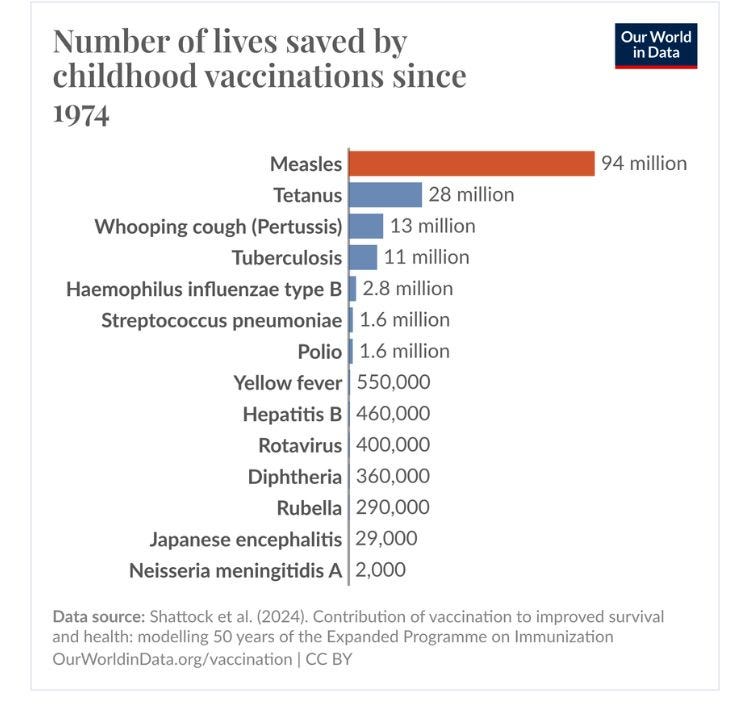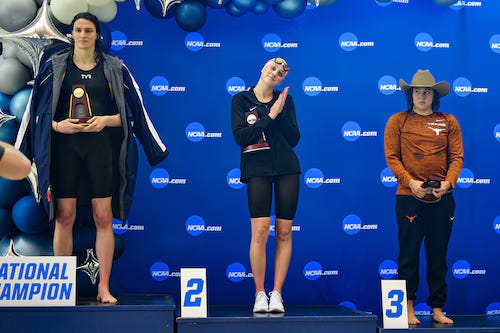You Cannot Only Sometimes Stand for Truth
D'you really think you can stand upright in the winds that blow now?
Donald Trump has nominated a vaccine sceptic to be the next US Health Secretary. RFK Junior is not only a sceptic about the COVID vaccine - though that would be bad enough. Though he denies being opposed to vaccines, he has said that the vaccine safety regime has ‘huge deficits’, has repeated debunked claims that vaccines cause autism and has been accused of giving succour to the anti-vaccine movement on numerous occasions, including in Samoa - where a measles outbreak killed over 80 children in 2019.
Vaccines are one of the single biggest contributors to falling child mortality - and overall increased life expectancy - that we know of. Since 1974 alone, they are estimated to have saved 150 million lives - and this doesn’t even include the lives saved by the great vaccination campaigns against smallpox and polio earlier in the 20th century.
Now, it is highly unlikely that RFK Junior will end childhood vaccination programmes in the US. But with highly infectious diseases such measles relying on very high vaccination rates to maintain ‘herd immunity’ and prevent spread, even a small fall in vaccination rates could lead to outbreaks. Approximately 1-2 people out of every thousand who get measles die - and some of the other childhood vaccination diseases having cases higher fatality rates.
When vaccination rates fall, children die.
So, with what credibility does our public health establishment refute the vaccine sceptics? How have our scientists, our learned societies, our top medics, our hospitals, our public officials and our trusted media brands protected their integrity? Have they stood for truth?
Well, let’s see.
They’ve told us that women can have penises, that men can become pregnant and referred to visibly, obviously, male rapists as ‘she’.1 They’ve not just repeated these lies, they’ve sought to silence and cancel those who refused to affirm them.
On the flimsiest of evidence, they’ve argued that it’s ‘safe’ for men to take cocktails of chemicals in order to feed babies by ‘chest-feeding’ - whilst simultaneously warning breast-feeding mothers to avoid spicy food. They’ve argued that biological males have no statistical advantage in sport.
At the height of the COVID-19 lockdown, when schools were shut, playgrounds off limits and outdoor sport banned, the public health authorities suddenly said gathering in large crowds was OK - provided it was for a Black Lives Matter protest2.
A Democrat data scientist was fired for sharing long-established research that showed that, while peaceful protest often increased support for a cause, violent protests often caused opinion to backfire.
Scientific American, once the world’s pre-eminent popular science magazine, published an article calling a distinguished entomologist racist for having referred to ants living in ‘colonies’ and using the standard scientific term ‘normal distribution’. When this was criticised, rather than recanting3, the editor doubled down.
One minor thing I noticed personally was when food information labels stopped saying, ‘The average man needs 2500 calories a day, the average woman needs 2000 calories a day’, replacing it with ‘the average person needs 2000 calories a day’. No doubt it was considered politically incorrect to suggest there were any biological differences between men and women4.
People are naturally anxious about what goes into their body. Being ill, being treated, is a position of vulnerability. Modern medicine involves technologies, drugs and procedures that make use of advanced science and medical knowledge that go well beyond what most of us can understand. Our acceptance of it is based on trust: the trust that we place in our doctors, health experts, scientists and public officials, often mediated by what we read in the news.
And the medics and scientists have, sadly, not always lived up to that trust. From the Tuskegee Syphilis experiments to the Alder Hey scandal, there are too many examples of deeply unethical behaviour. In other cases, such as the Infected Blood Scandal, or the case of thalidomide, the harm was done in error - but was no less severe for that.
Trust is hard won, but easily lost. You cannot only sometimes stand for truth5.
On vaccination, the idea that injecting a weak form of a disease, or a piece of messenger RNA, into yourself will protect you from that disease is highly counterintuitive. It just happens to be completely true.
Most people can’t tell you how or why a vaccine will give you immunity. They can’t6 read the papers and meta-analyses to figure out from first principles that the MMR vaccine doesn’t cause autism. They don’t have the training to know whether or not your new mRNA vaccine has been tested enough to be safe. They have to take it on trust.
But here’s the rub.
They can tell that you’re lying when you say that a bearded bloke is a woman. They know that men can’t get pregnant. And they’re smart enough to tell when your public health guidance varies based on the perceived righteousness of the activity.
They know that this isn’t fair play:
You cannot only sometimes stand for truth.
As Sir Thomas More might have said, this country was planted thick with truths, from coast to coast. But you’ve cut them down. And now the last truth is down, and the Devil has turned on you, where will you hide, the truths all being flat? D'you really think you can stand upright in the winds that blow now?7
Was it worth it?
This post is a follow-up to to a 2018 post, Post-Modernism and the Devil, covering similar themes. Sadly the abandonment of truth - and the consequential decline in trust of authority - has only worsened since then.
With hindsight, it was fairly safe to join an outdoor protest - as we learned later that COVID spread very poorly outdoors. However, at the time, most other outdoor activities - of similar or lower risk - were banned, and the bye given to BLM protests was clearly not made in line with other public health advice or rules in place at the time..
Every publication publishes dumb stuff sometimes.
Interestingly, on the NHS site, or the detailed Government guidance, it still gives the correct, differentiated figures. This reminds me also of during COVID, where the full JCVI reports on vaccinating children of different ages were very nuanced and carefully set out the balance of risks and benefits. It is somewhat reassuring that, although many organisations - including scientific and health organisations - are compromised, individual scientists and medical staff, writing in technical documents, still feel able to set things down truthfully. Though clearly, any public health approach that relies on the general public reading technical reports, is not a good one.
By this I do not mean that one has to speak up about every thing false one sees in the world. Silence is not (usually) complicity. Everyone has only so much time; they have to make their choices about where to spend it. But I mean that you cannot sometimes speak outright, obvious, lies and expect to retain people’s trust.
Or simply don’t have the time, or inclination.
"Roper: So now you'd give the Devil benefit of law!
More: Yes. What would you do? Cut a great road through the law to get after the Devil?
Roper: I'd cut down every law in England to do that!
More: Oh? And when the last law was down, and the Devil turned round on you — where would you hide, Roper, the laws all being flat? This country's planted thick with laws from coast to coast — man's laws, not God's — and if you cut them down — and you're just the man to do it — d'you really think you could stand upright in the winds that would blow then? Yes, I'd give the Devil benefit of law, for my own safety's sake."
- A Man for All Seasons




Great post. I'm not sure society has ever really been dedicated to truth, although Scientific American falling is quite sad and the new categories of obvious lies are quite pernicious. But I don't know whether things were overall better in say the 1970s. There's a stereotype of police or mayoral statements being unreliable that's been in fiction for as long as I can remember.
"One minor thing I noticed personally was when food information labels stopped saying, ‘The average man needs 2500 calories a day, the average woman needs 2000 calories a day’, replacing it with ‘the average person needs 2000 calories a day’. "
That sounds like a change in the actual recommendation (perhaps to combat obesity?) rather than *just* eliding the sex difference (although clearly that's a factor too).
Otherwise, surely they'd have changed it to "the average person needs 2250 calories a day"?